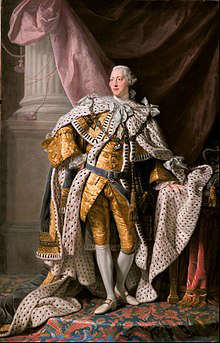

King of Great Britain
Prince George 4 June 1738 NS c Norfolk House, St James's Square, London, England
29 January 1820(1820-01-29) (81) Windsor Castle, Berkshire, England
NamesGeorge William Frederick
King of Great Britain and Ireland from 1760 to 1820 For other uses, see George III (disambiguation). George IIICoronation portrait by Allan Ramsay, 1762King of Great Britain and Ireland, Elector/King of Hanover (more...) Reign25 October 1760 – 29 January 1820Coronation22 September 1761PredecessorGeorge IISuccessorGeorge IVRegentGeorge (1811–1820)BornPrince George 4 June 1738 Norfolk House, St James's Square, London, EnglandDied29 January 1820(1820-01-29) (aged 81) Windsor Castle, Berkshire, EnglandBurial16 February 1820 St George's Chapel, Windsor CastleSpouseCharlotte of Mecklenburg-Strelitz (m. 1761; died 1818)IssueGeorge IV, King of the United KingdomPrince Frederick, Duke of York and AlbanyWilliam IV, King of the United KingdomCharlotte, Queen of WürttembergPrince Edward, Duke of Kent and StrathearnPrincess AugustaElizabeth, Landgravine of Hesse-HomburgErnest Augustus, King of HanoverPrince Augustus Frederick, Duke of SussexPrince Adolphus, Duke of CambridgePrincess Mary, Duchess of Gloucester and EdinburghPrincess SophiaPrince OctaviusPrince AlfredPrincess AmeliaHouseHanoverFatherFrederick, Prince of WalesMotherPrincess Augusta of Saxe-GothaReligionProtestantSignature George III (George William Frederick; 4 June 1738 – 29 January 1820) was King of Great Britain and Ireland from 25 October 1760 until the union of the two kingdoms on 1 January 1801, after which he was King of the United Kingdom of Great Britain and Ireland until his death in 1820. He was concurrently Duke and Prince-elector of Brunswick-Lüneburg ("Hanover") in the Holy Roman Empire before becoming King of Hanover on 12 October 1814. He was a monarch of the House of Hanover but, unlike his two predecessors, he was born in Great Britain, spoke English as his first language and never visited Hanover. George's life and reign, which were longer than those of any of his predecessors, were marked by a series of military conflicts involving his kingdoms, much of the rest of Europe, and places farther afield in Africa, the Americas and Asia. Early in his reign, Great Britain defeated France in the Seven Years' War, becoming the dominant European power in North America and India. However, many of Britain's American colonies were soon lost in the American War of Independence. Further wars against revolutionary and Napoleonic France from 1793 concluded in the defeat of Napoleon at the Battle of Waterloo in 1815. In the later part of his life, George had recurrent, and eventually permanent, mental illness. Although it has since been suggested that he had bipolar disorder or the blood disease porphyria, the cause of his illness remains unknown. After a final relapse in 1810, a regency was established. His eldest son, George, Prince of Wales, ruled as Prince Regent until his father's death, when he succeeded as George IV. Historical analysis of George III's life has gone through a "kaleidoscope of changing views" that have depended heavily on the prejudices of his biographers and the sources available to them.

We use cookies
We use cookies and other tracking technologies to improve your browsing experience on our website, to show you personalized content and targeted ads, to analyze our website traffic, and to understand where our visitors are coming from. Privacy Policy.